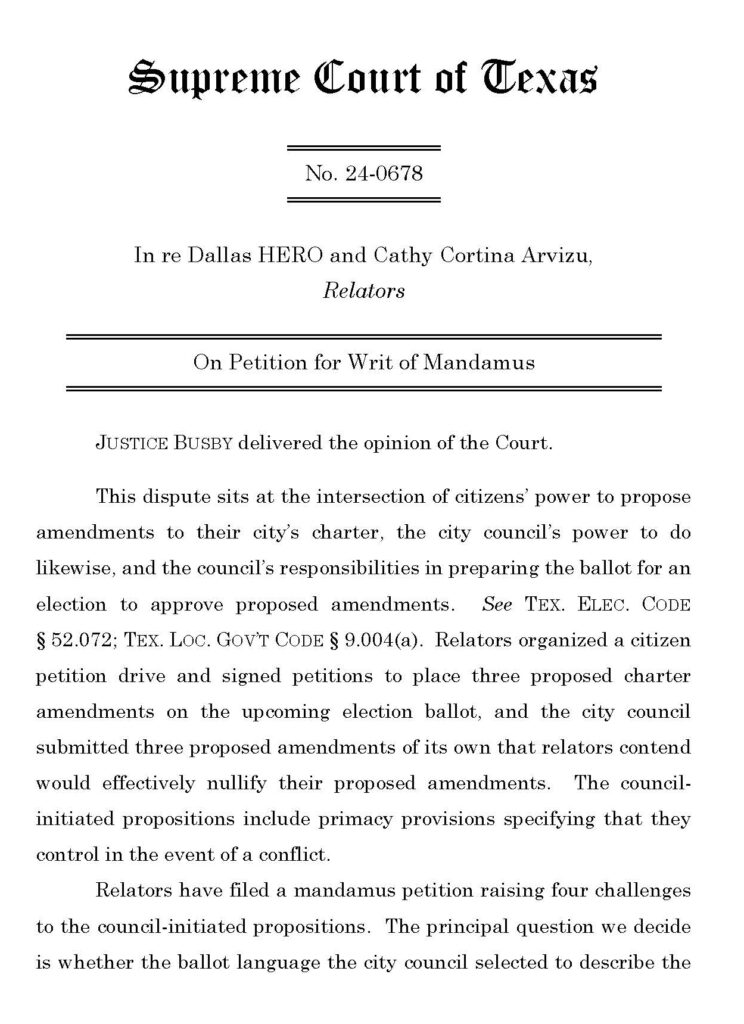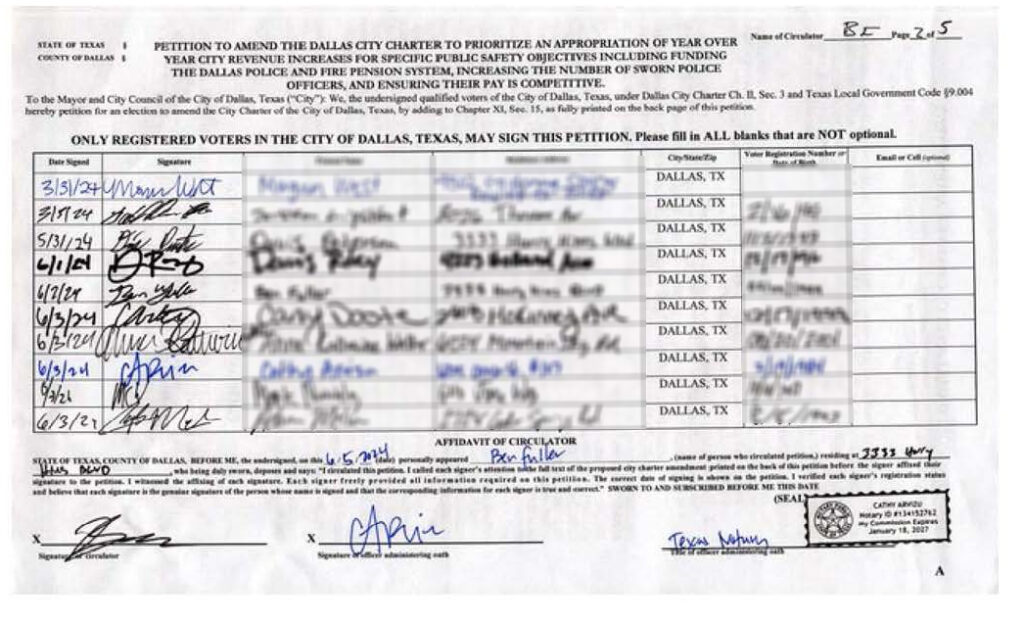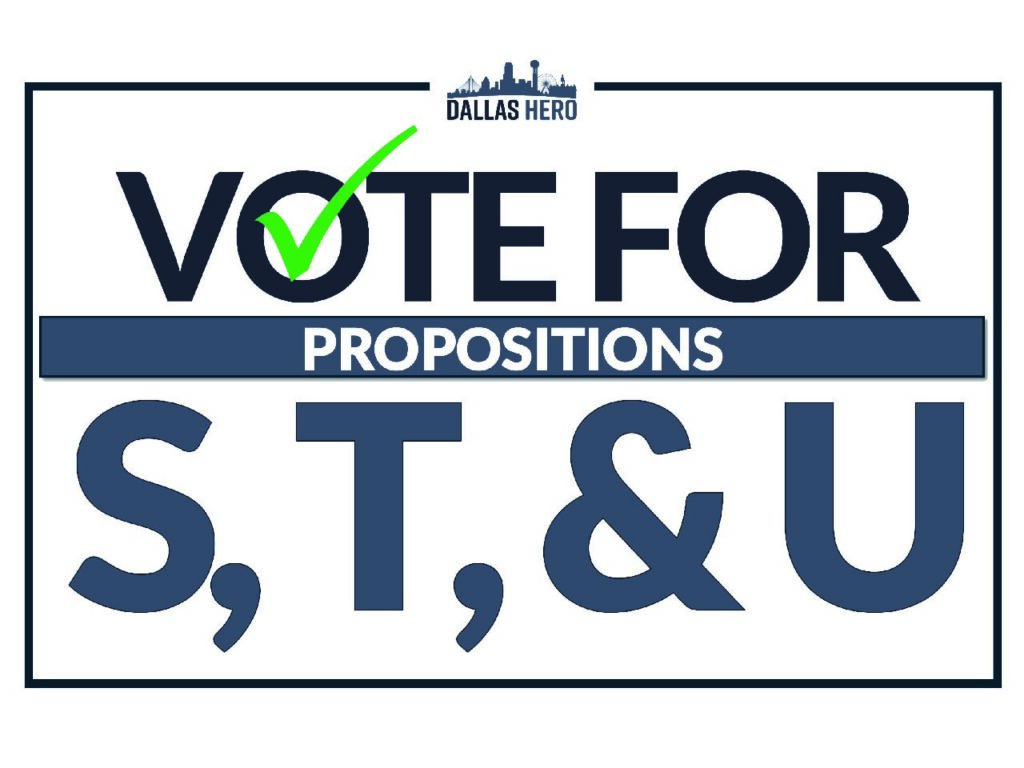At the November 5, 2024 general election, residents of Dallas passed historic City Charter amendments ensuring greater accountability and public safety. The Martinez de Vara Law Firm represented Dallas HERO, the nonprofit organization which circulated the proposed amendments. The Firm drafted the three reform propositions, later named Propositions S, T and U and defended them against the City's ballot interference at the Texas Supreme Court, winning the precedent setting case In RE DALLAS HERO. Over 170,000 Dallas residents signed the three HERO propositions.

Dallas has suffered from chronic problems over years, among these are understaffing of police. An ordinance passed in the 1980s requires Dallas to maintain a police officer to resident ratio of 3 to 1000, but Dallas has failed to reach this level in years. D Magazine recently reported that "it takes an average of two hours for police to respond to incidents like robberies, assaults, major accidents, and in progress auto thefts. Art Martinez de Vara, explained at a recent media event regarding the prepositions, "the issue is not recruitment, its retention. Dallas annually recruits and trains over 200 officers, but looses nearly just as many." Low pay and underfunding of the Dallas Police and Fire Pension are often cited as critical factors in local police retention.
Across America city residents are frustrated with the direction of their local municipality, but have few options when City's violate or chose to not follow federal, state or local laws. One of the big factors preventing accountability is sovereign immunity, which shields governments from lawsuits. In Texas, sovereign immunity generally shields local governments from lawsuits except for certain statutory waivers of that immunity, most notably the Texas Tort Claims Act, which waives immunity in cases such as motor vehicles accidents, property damage and wrongful death. The Dallas HERO Propositions were designed to address the chronic public safety issue in Dallas and to allow residents the ability to hold the City Council directly accountable for their inactions, omissions and refusal to comply with existing laws.

Proposition S requires the City of Dallas to waive its governmental immunity and allow any Dallas resident to sue the City if it is not complying with federal law, state law, the City Charter or local ordinances. The waiver of immunity only allows for injunctive relief to compel the city into compliance with existing law, and does not allow an award of monetary damages.
Proposition T establishes performance based compensation for the City Manager. The amendment requires the city to conduct a quality of life survey of residents annually. Based upon the results the City Manager could earn performance-based compensation up to 100% of their regular salary for exemplary performance, no additional compensation for average performance, and termination for the worst performance.
Proposition U requires the city to maintain a ratio of 3 police officers per 1000 residents. It also ensures that base salary for Dallas Police Officers is in the top 5 regionally and requires half of all new revenue be allocated to the Police an Fire Pension, until it reaches solvency.

Dallas voters approved Propositions S and U at the November 5, 2024 election. Proposition T failed, earning only 45% support of voters.
Residents in Texas who seek to reform their municipal governments face a complex web of challenges rooted in state laws, political resistance, and voter engagement issues. Texas law places significant limits on local government powers, especially in smaller cities, where state oversight often constrains local decision-making. This can make it difficult for residents to enact changes like charter amendments or implement new governance structures. In "home-rule" cities, where greater self-governing powers are allowed, residents may have more flexibility. However, they still face challenges when reforms conflict with state mandates or require changes to established local ordinances.
Political resistance is another major hurdle. Incumbent officials may resist reforms that could limit their influence, reduce their terms, or change the structure of the municipal government in ways that threaten their position. Even when residents organize grassroots movements for reform, they often encounter well-funded opposition from entrenched interests with a stake in maintaining the status quo. Dallas HERO's opposition, a coalition of current and former elected officials, and several local Chambers of Commerce, outspent Dallas HERO 4 to 1 in their campaign to defeat Proposition S, T and U.
For reform-minded residents, overcoming these challenges requires persistent grassroots organizing, public education, and a willingness to engage with complex state laws governing municipal governance. Successful reform is possible but requires a sustained, community-wide effort and legal representation with .
